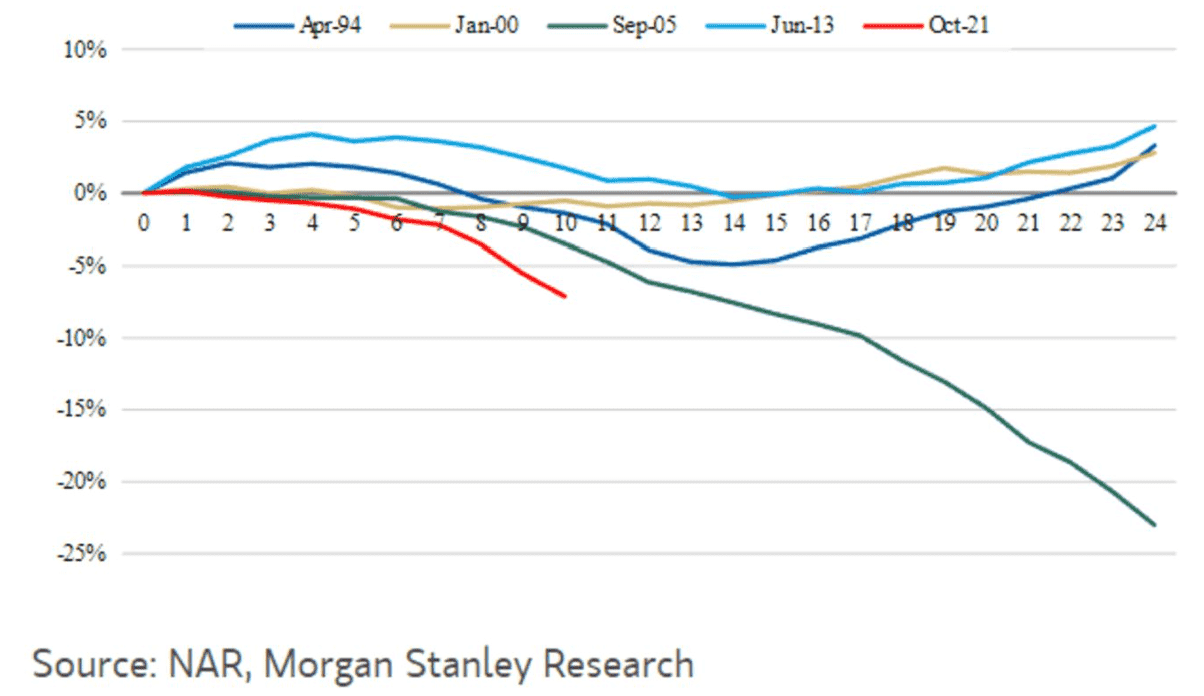TOGETHER WITH  | Good day! Housing bubbles are a tricky thing. One telltale sign of one is when home prices decouple from local rent prices and wages. Based on data from the Real Estate Bubble Index by UBS, which examines 25 global cities, which of the following cities has the highest real estate bubble risk? a. Toronto, b. Hong Kong, c. Miami. Follow the wave 🌊 below for the answer. The topics for today are: - The power of AI
- Best place to get a loan? Maybe your family
- Refinancing vs. repricing
| |
INNOVATION The Power of AI |  | | AI generated image "Finny in the style of Picasso" from DALL·E 2, OpenAI | | | Artificial intelligence has been looming on the horizon for what seems like decades now. It's become increasingly common to casually see the tools of AI progress in action. The progress of AI - Applications: From AI-generated art, articles, and even dissertations, to applications across industries like healthcare and manufacturing, we've come a long way from just teaching computers to play chess. "Every single company on the planet will be an AI company in the future," according to Bernard Marr, author and strategic business & technology advisor to governments and businesses.
- Projections: AI isn't quite classifiable as an "industry" yet, but with its growth expectations, it could soon arrive there. Most projections have the AI niche reaching over $420B in total market size by 2028, a compound annual growth rate (CAGR) of 39.4%.
- Blowing up: AI and machine learning startup businesses raised $115B in 2021, which is more than one-third of the total venture capital raised for all startups throughout the year. Funding is down this year in comparison, but it's down across the board — the trend remains clear.
- Adoptions: About 26% of companies say they've implemented AI in widespread production — up from 12% last year — and 92% of large companies said they're notching a noteworthy ROI on their investment into data and AI.
The inevitability of the future There are some harbored fears surrounding AI ranging from doomsday scenarios to simple ethics concerns, but the overall trend is clear, and investors seem to have confidence that humanity will make the necessary adjustments to coexist with this new tech. AI's rapid pace and progress will continue for the foreseeable future. Whether through business or investment, getting some exposure to this budding sector is probably unavoidable. Take this related lesson on this topic and earn Dibs 🟡 while you're at it: | | | |
MANAGING DEBT Best Place To Get A Loan? Maybe Your Family | | | | We all know someone with a story about their uncle that still owes them five grand for a truck, right? Mixing family and financial affairs is usually a no-go for most of us, but sometimes, if done properly, it can be an excellent cheat code to save a lot of money. And that's exactly what some people are doing now. With mortgage rates hitting a 20-year high, intra-family mortgages have suddenly become an intriguing option. What to know about family lending - Formalizing is key: When you obtain a mortgage from a traditional lender, the details of that contract can consume dozens of pages. The details matter, and maybe even more so with a family loan. Make sure to spell out all the important nitty gritty of this transaction, and plan for future contingencies as well.
- Interest is applied: For this transaction to be a legitimate loan and not considered a gift, it must be formalized, which, per the IRS, means interest must be charged on loans of $10K or more. The rate is negotiable, but the IRS does set a limit on how low it can be via the "Applicable Federal Rate," which is currently 3.30% for a long-term loan like a mortgage.
- Incorporating gifting: For 2022, individuals are allowed to give up to $16,000 to any number of people, and spouses are allotted up to $32,000 per person. Even if you exceed this, no taxes will be due unless you've exceeded your lifetime estate exclusion limit of $12.06M, but the extra paperwork might be annoying. Gifting can be incorporated into this loan process in the form of paying for down payments, repairs, upgrades, etc.
- It's not for everyone though: If we're being honest, most participating in this type of lending are wealthier families that have some funds to spare to help their relatives, most often children. Additionally, some people might not be comfortable giving their children money or forming a bank-like partnership with them.
| | | |
TOGETHER WITH TALLY Outsmart Your Credit Card Debt | | | | How can you outsmart your high-interest credit card debt? Meet Tally.Their lower-interest line of credit was designed to get people out of credit card debt faster and save big. Featured in CNBC, Forbes, The New York Times, and Yahoo Finance, Tally is here to get you credit card debt-free, ASAP. Check your rate without hurting your credit score. Learn more about Tally today. *See disclosures.
| | | |
MONEY TIP Refinancing vs. Repricing | | | | With interest rates on the rise, fewer current homeowners are refinancing — 84% less than this time one year ago and now sitting at a 22-year low. However, this record drop is bound for an eventual rebound. And before they do, it's probably worth clarifying the difference between refinancing and repricing. Into the details - Their differences are clear, even though they share similar goals. Refinancing refers to closing out your current home loan and replacing it with a new one, whereas repricing is simply a re-negotiation of terms with your current bank.
- The costs: A refinance is typically more expensive (the US average is $4,345 on a $160K mortgage), varies depending on the principal value of the loan, and can take up to a few months to complete. Repricing on the other hand is a flat fee charged by the bank, usually costing between $500 and $1,000 depending on the size of the loan, and can be finalized in less than a month.
- The decision process: Looking at the differences here, a logical decision-making process is to first investigate repricing a loan with your existing bank, then to explore a refinance to see if the difference is worth it.
- Make it count: Make sure the savings are worth the fees, time, and hassle it takes to go through the process, and if the difference is negligible, wait until it's not.
Take this related lesson on this topic and earn Dibs 🟡 while you're at it: | | | |
🔥 TODAY'S MOVERS & SHAKERS | - Allstate (-11.5%) after the insurance company said it would report Q3 earnings losses. Catastrophic claims will increase due to Hurricane Ian.
- Tesla (-5.8%) beat earnings expectations for the current quarter, but revenues fall short. The EV company cut its full-year growth expectations but per Elon Musk, the company will "sell every car that we make for as far into the future as we can see."
- S&P 500 Index (-0.2%) to $3,719.29 (1D)
- Bitcoin (+0.3%) to $19,191.80 (1D)
- Ethereum (+0.5%) to $1,291.38 (1D)
This commentary is as of 9:45 am PDT. | | | |
🌊 BY THE WAY | - 🍁 Answer: Toronto sits atop the list, with Hong Kong sitting at #5, and Miami at #10 (Visual Capitalist)
- 📈 The IRS is increasing the standard deductions for 2023 as inflation intensifies (NPR)
- 💕 ICYMI. Open enrollment power tips for spouses (Finny)
- 🛍️ Retailers are sitting on a $548.8B pile of inventory and will soon fill store shelves with leftover holiday inventory (Reuters)
- 💳 Inflation-slammed Americans are piling on credit card debt (CBS)
- Finny lesson of the day. With open enrollment fast approaching for many of us, every edition this month, we'll highlight a lesson related to benefits offered at work:
| | | |
|
What did you think of Finny's The Gist today? (Click to vote) | | | |
| About Tally Technologies, Inc. NMLS # 1492782 NMLS Consumer Access, [See Licenses]. Lines of credit issued by Cross River Bank, Member FDIC, or Tally Technologies, Inc. ("Tally"), as noted in your line of credit agreement. Loans made by Tally pursuant to California FLL license or other state laws. To get the benefits of a Tally line of credit, you must qualify for and accept a Tally line of credit. Based on your credit history, the APR (which is the same as your interest rate) will be between 7.90% - 29.99% per year. The APR will vary with the market based on the Prime Rate. Annual fees range from $0 - $300. About Finny Finny is a financial wellness platform on a mission to make your money work for you. The Gist is Finny's twice-a-week (Tues & Thurs) newsletter covering personal finance & investing insights and money trends. The content team: Austin Payne, Carla Olson, Chihee Kim. Finny does not offer investment and stock advice. We're thankful for the support of today's brand sponsor—Tally—as they make rewards on our platform possible. If you're interested in sponsoring The Gist, please reach out to us. And if you have any feedback for us, please contact us. | | | | | | | |

















